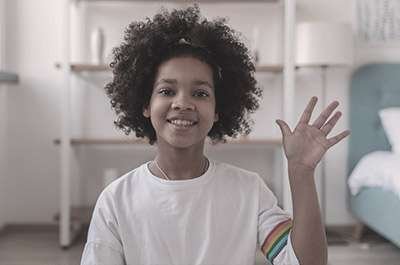When it comes to making friends, many children feel anxious or insecure. If your child is one of those kids, here are 10 tips to help them become more social and confident. With a bit of practice and patience, they’ll make new friends in no time!
Be social yourself.

Children learn how to act by watching you! If you want your child to be social, take time to talk with others and make new friends. Go out of your way to mention things that are going on in your life or ask others about their lives. Mention when a family member has a birthday coming up; this gives people the opportunity to congratulate them and wish them a happy birthday. If your child sees you doing this, it makes them want to be more social too!
Do things together. With the busy lives we all lead, many parents try to save time by having their children do things alone. The problem with this is that no one wants to play with someone they have to entertain all the time.
It’s great when your child wants to play alone for a while, but it’s essential to set aside some one-on-one time with them too. After all, you are their best friend! Don’t be afraid of joining in on their pretend games or imaginary adventures, either. Children love role models that join in on the fun!
Break the ice.
Inviting a child over to play is a good idea. Break this ice by first asking the parents if they would be okay with it and who their child might like to bring as a friend. If you know some of these kids already, ask them to come over too. If you have a son or daughter that enjoys sports or other activities, see if they would like to have friends come over and join them after school for a little bit.
In general, it’s easier for children to play with people they already know, so consider inviting friends of your child’s first. Don’t worry about the “perfect” invitation either. If your child is inviting kids to come over, be flexible with the day and time so that parents can schedule accordingly.
Model friendly behavior yourself.
If your child sees you treating others with kindness and respect, they’re more likely to follow in your footsteps. It may be hard at first but remember that you want your child to feel comfortable enough to come to you if a problem should arise. Be aware of teasing other children or laughing at jokes made about other kids. Don’t overreact when other children have a hard time making friends, either.
Kids look up to their parents and try to mimic them. If your child sees you making new friends or doing kind things for others, chances are they’ll want to be more social too.
Encourage them to say “hello.”

It’s easy to play with the kids that live in your neighborhood, but sometimes children are too shy to introduce themselves. If you’re walking by a neighbor’s house and their child sees you, stop for a moment and say “hello” before continuing on your walk.
Children learn how to act at home. When you take time to talk to their parents or a neighbor, it teaches them that it’s socially acceptable to introduce themselves. If you don’t have time to stop and chat, wave from the sidewalk instead.
Your child might be too shy to go up and say hello to the other kids, but encourage them anyway. Sometimes it takes a little push to get your child started.
If they don’t know what to say, explain that “it’s okay not to know everything about everyone” and that “you can ask what other people like for fun or what they like to play.” Just getting off on the right foot can put your child in a more social mood.
Even if your child is afraid or shy, encourage them to at least say “hello” when they’re in the company of others. If you can get them to smile and wave, too, that’s even better! This one step can make a child feel more confident and willing to talk to others.
Encourage them to join in group activities.
If your child has friends over, have them participate in group games or activities. Make some fun music to dance to, set up a game of tag, or play with your child’s toys together.
It can be intimidating for children to join in on an already established activity. If they do want to join in, though, encourage them to. Sometimes children might put themselves down or say things like “oh, I’m not good at that” without even trying it first. Help your child to see that they need to give something new a try before making judgments about it.
Make sure to include your child in group activities so they can learn how to fit in with others and not be afraid to try new things. Sometimes they might need a little bit of encouragement, but they must see other people participate as well.
Let them go first.
When you see other kids, encourage your child to say “hi” first or open up the conversation. Encourage them by saying things like “maybe Billy would like to talk about” and “let’s ask him what he thinks.”
I know this can be tough to do. It can feel like you’re pushing your child into doing something that might not benefit them, but trust me – it is for their own good. If they see that other kids are talking or playing together already, they’ll want to join in.
Sometimes kids can be afraid of what others think or how they’ll respond, but encourage them to go first anyway. It might take a little practice, but it will get easier with time, and you’ll find that your child begins joining in conversations more often!
Let them know that it’s okay to be a little shy.

If your child seems nervous or hesitant to play with the other children, remind them that it’s okay not to know what to say or feel shy. Later on, if they get into the conversation, that’s great, but if they’re quiet for a little while, it isn’t a big deal either.
Sometimes kids are nervous because they don’t know what to say or feel shy about joining in with other kids. Remind them that they can take their time and don’t have to say anything if they don’t want to. If your child does start talking, though, encourage them by saying things like “good job” or “that’s right.”
Your children might need some encouragement when playing with others. If they’re feeling shy or nervous, let them know that it’s okay, and they don’t have to force themselves if they don’t want to. Let your child take their time and only encourage them if they decide to talk with the other kids.
Teach them how to introduce themselves.
If your child is playing with other kids at the playground, teach them how to introduce themselves. If they don’t know what to say, suggest that they can say, “Hi, my name is ____.” Sometimes children are shy about telling their names, so help them out if necessary.
It might be challenging for some of you to keep quiet while your child introduces themselves to someone new. But this is for their own good so try not to say anything unless they really get stuck! They might already know how to say their names but need some help with the phrasing, or maybe they don’t know what to say at all.
If your child needs some coaching about how to introduce themselves, give them some advice. They might already know but just need a little help saying it, or they might not know what to say at all! Either way, coach them along until they’re able to talk to other kids on their own.
Teach them how to play games and share with others.
Most playground games are easy to learn and require more than one person. Teach your kids how to play tag, red light / green light, hopscotch, etc., during the summertime so they can spend their time playing with other kids instead of alone or bothering you. Practice different games at home so it will be easier for them to learn when they get on the playground.
If your child wants to play a game with other kids on the playground, teach them how to play it. If they don’t know how to show them during your free time, it’ll be easier for them to socialize when they get to play it whit other kids. Practice different games at home and encourage your child to play with the other kids at the park.
Teach them how to resolve conflicts peacefully.

Most playgrounds have rules about resolving conflicts without hurting or getting mad at someone.
If your child isn’t familiar with the playground’s rules on resolving conflicts, teach them during your free time. Encourage your kids to play with each other and if they get into a fight, then remind them of the park’s rules for resolving conflicts peacefully there’s a disagreement over a toy, teach kids to take turns, don’t keep it if someone else is using it, and apologize. These are all good skills for kids to learn that can help them with their social skills.
As you probably already know, sometimes children disagree over certain things on the playground. When this happens, teach your child how to resolve conflicts without hurting or getting mad at someone. Remind them that it’s okay to be angry, but they shouldn’t use any words that hurt others’ feelings or take anyone’s toys away.
As a parent, it’s important to consistently reinforce the playground rules to your child. Despite the need for frequent reminders, the effort will pay off in the long run. Encourage your child to avoid hurtful language, physical aggression, and taking toys from others.
Knowing how to resolve conflicts peacefully will help your children’s social life.
Conclusion.
Although it can be difficult, helping your child make friends is a process that will pay off in the long run. By following our tips and being supportive, you can help pave the way for your child to have lasting friendships.
What strategy have you found to be most successful when helping your child make friends?

Dive into the insights of Matthew Mansour, a seasoned life coach, fitness guru, and health mentor. With a portfolio boasting over 800 thought-provoking articles, Matthew is passionate about unraveling the intricate layers of the human psyche. His reading choices? Books that shed light on our unique human journey, helping him (and his readers) harness the power of the mind, transforming challenges into stepping stones.
Matthew proudly wears his badge as a self-help aficionado. His mantra? There’s always room to grow, learn, and be inspired. He thrives on gleaning wisdom from pioneers, turning their experiences into valuable lessons for all.
Always on the pulse of emerging trends, Matthew immerses himself in groundbreaking courses and research centered around life coaching and holistic health. Eager to impart his knowledge, he’s here to guide anyone keen on enhancing their life journey.
Beyond his professional persona, Matthew is a devoted animal lover, a proud New Jersey resident, and a doting husband and father. Dive into his self-improvement blog and let Matthew guide you towards a life filled with purpose and passion!
Reviewed By: Joanna Perez and Marcella Raskin
Edited By: Lenny Terra
Fact Checked By: Gabrielle J. Smith
Photos Taken or Curated By: Matthew Mansour